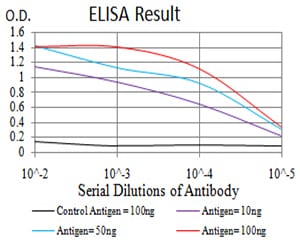

| WB | 咨询技术 | Human,Mouse,Rat |
| IF | 咨询技术 | Human,Mouse,Rat |
| IHC | 咨询技术 | Human,Mouse,Rat |
| ICC | 技术咨询 | Human,Mouse,Rat |
| FCM | 1/200 - 1/400 | Human,Mouse,Rat |
| Elisa | 1/10000 | Human,Mouse,Rat |
| Aliases | MPP2; TGT3; HFH11; HNF-3; INS-1; MPP-2; PIG29; FKHL16; FOXM1B; HFH-11; TRIDENT; MPHOSPH2 |
| Entrez GeneID | 2305 |
| clone | 6F11A8 |
| WB Predicted band size | 84.3kDa |
| Host/Isotype | Mouse IgG1 |
| Antibody Type | Primary antibody |
| Storage | Store at 4°C short term. Aliquot and store at -20°C long term. Avoid freeze/thaw cycles. |
| Species Reactivity | Human |
| Immunogen | Purified recombinant fragment of human FOXM1 (AA: 649-748) expressed in E. Coli. |
| Formulation | Purified antibody in PBS with 0.05% sodium azide |
+ +
以下是3-4条关于FOXM1抗体的参考文献概览:
---
1. **文献名称**:*FOXM1: A typical proliferation-associated transcription factor*
**作者**:Koo CY, et al.
**摘要**:本文综述了FOXM1作为细胞增殖关键调控因子的功能,强调其抗体在检测肿瘤组织中的过表达和核定位中的应用,尤其在癌症预后评估中的作用。
2. **文献名称**:*Validation of a specific FOXM1 monoclonal antibody for immunohistochemical analysis in human tissues*
**作者**:Xia H, et al.
**摘要**:研究验证了一种FOXM1单克隆抗体的特异性,证明其在Western Blot和免疫组化中可有效区分FOXM1的不同剪切变体,适用于乳腺癌和肝癌的临床样本检测。
3. **文献名称**:*FOXM1 inhibition enhances chemosensitivity of cisplatin-resistant ovarian cancer cells*
**作者**:Li Q, et al.
**摘要**:通过FOXM1抗体检测发现,抑制FOXM1可降低耐药卵巢癌细胞中DNA修复相关蛋白的表达,为联合化疗提供分子机制证据。
4. **文献名称**:*FOXM1 regulates the expression of spindle assembly checkpoint components in mitosis*
**作者**:Park HJ, et al.
**摘要**:利用FOXM1抗体进行免疫荧光实验,揭示了FOXM1在调控有丝分裂纺锤体检查点中的关键作用,其缺失导致染色体不稳定。
---
以上文献均涉及FOXM1抗体的实验应用,涵盖癌症研究、抗体验证及分子机制探索等领域。
FOXM1 (Forkhead box protein M1) is a transcription factor belonging to the Forkhead family, known for its critical role in regulating cell cycle progression, proliferation, differentiation, angiogenesis, and metastasis. It is highly expressed in actively dividing cells and is frequently overexpressed in various cancers, correlating with poor prognosis and therapeutic resistance. FOXM1 antibodies are essential tools for studying its expression, localization, and functional mechanisms in both normal physiology and disease contexts.
These antibodies are widely used in techniques like Western blotting, immunohistochemistry (IHC), immunofluorescence (IF), and chromatin immunoprecipitation (ChIP) to detect FOXM1 protein levels, subcellular distribution, and DNA-binding activity. Monoclonal antibodies offer high specificity for FOXM1 isoforms (e.g., FOXM1b/c), while polyclonal antibodies may detect broader epitopes. Researchers often validate them using knockout cell lines or siRNA knockdown to confirm target specificity.
FOXM1 antibodies have advanced cancer research by identifying its role in tumorigenesis, metastasis, and drug resistance. They also aid in exploring FOXM1 as a potential diagnostic biomarker or therapeutic target. Challenges include cross-reactivity with other Forkhead family members and variability in detection due to post-translational modifications. Selecting well-validated antibodies and optimizing experimental conditions are crucial for reliable results in FOXM1-related studies.
×